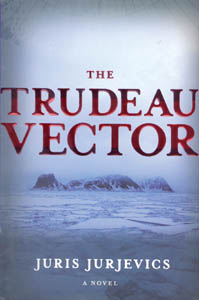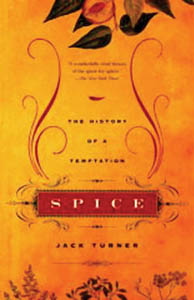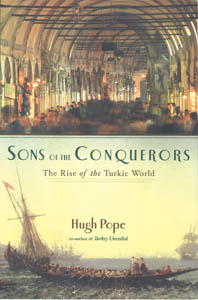![[whitespace]](/gifs/whiteline2.gif) |
Book Box

The Trudeau Vector
The Hot Zone gets the chill-factor treatment in Juris Jurjevics' medico-thriller. At an Arctic research center built by the Canadians, a deadly what's-it is killing scientists in terrible ways—calcifying their innards and eating away the pupils of their eyes. Dr. Jessica Hanley, a crack American epidemiologist, parachutes into the frozen facility to investigate. Hanley is a UC-Santa Cruz grad and therefore espouses the virtues of homeopathy (the school needs an anti-defamation league to stamp out that kind of stereotyping). Meanwhile, a Russian agent disappears in a submarine, setting up a breathless parallel plot. But the real action is in the lab, where Hanley rushes to isolate the contagion—stopping only for a couple of perfunctory sex scenes with an Inuit engineer: "He stripped off their clothing and took her. The pleasure was nearly painful." The rat-a-tat narrative sometimes stalls in flurries of factoids about cold-weather survival gear, but the denouement makes useful nods toward the dangers of global warming. The Trudeau Vector is perfect summer reading, even if Labor Day has come and gone. (By Juris Jurjevics; Viking; 400 pages; $24.95 cloth)

Spice: A History of a Temptation
Neatly packaged in tins and bottles, spices are easy to take for granted. In times past, however, pepper, cloves, nutmeg and cinnamon were fiercely sought-after treasures that sparked ancient trading urges and jump-started Western Europe's voyages of exploration and colonial rapaciousness. Jack Turner's breezy (if a heavily annotated, near-400-page-long book can be called breezy) history of our spice jones ranges over the religious, sensual, medicinal and culinary uses of spices, liberally citing period sources, from Chaucer and John Donne to Dante (who consigned wealthy taste-bud indulgers to the lower rings of hell). Eventually, the spice prices plummeted, and the ultimate luxury became just another commodity. The process was aided by one of the most fascinating characters unearthed by Turner: the appropriately named Pierre Poivre, a one-armed 18th-century adventurer who plotted to break the Dutch monopoly in the Moluccas by stealing their spice plants and whisking them away to French colonies. (By Jack Turner; Vintage; 384 pages; $14.95 paper)

Sons of the Conquerors: The Rise of the Turkic World
Last month, Saparmurat Niyazov, president of Turkmenistan, banned lip-syncing in his country—at last, a despot who puts his powers to a good cause. The Central Asian tyrant, who has erected a revolving monument to himself ("a cross between a marble-clad space rocket and a tripod Eiffel Tower"), is just one of the many leaders, dissidents and intellectuals interviewed by Istanbul-based British journalist Hugh Pope for his fascinating trek through the lands of the Turkic people. Pope's main focus is on the "stans": Turkmenistan, Uzbekistan and Kazakstan. In these remote regions where the Huns and the Mongols rose up and headed west to conquer Byzantium, oil-rich countries struggle to slough off Soviet-era strictures and to maintain their balance between the Islamic fundamentalists on one side and the Chinese empire on the other. Despite a British tendency to romanticize nomadic tribes, a la Lawrence of Arabia, Pope offers significant insights into a region and a people likely to play an increasingly significant role in the 21st century. (By Hugh Pope; Overlook Press; 413 pages; $35 cloth)
—Michael S. Gant
Send a letter to the editor about this story to letters@metronews.com.
[ Silicon Valley | Metroactive Home | Archives ]
|
![[Metroactive Books]](/books/gifs/books468.gif)


